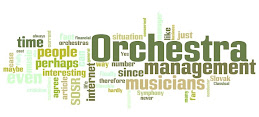In one of my previous articles on marketing music, I have already addressed the need of music education to change their programming. Since our modern society has a different pace and methods of exchanging information than 20 years ago, musicians (and especially those, who are to become musicians in the near future) should be made aware of this. PR, branding and entrepreneurship are not terms that exclusively belong to big commercial companies whether in the hi-tech software-, fashion- or oil business. Equally, musicians and the cultural institutions require such strategies in order to function in our world. Keeping a distance, because entrepreneurship simply is alien to them, will in the end result in a slow and a grinding halt.
The American double bass player and blogger Jason Heath beautifully lists and describes in his blog realistic scenarios which take currently place in music schools. What a music student expects, what is (thought) necessary to learn, and how it ends. Despite that there are certain regional specifics due to their setting in the USA, generally these scenarios are, in my view, also valid for most European students and professionals. The bottom-line of his article can be summarised in his passage:
What is quite mystifying: although for a few years, courses are being offered already here in Slovakia (especially at the Comenius University of Bratislava), yet I haven't noticed any visible outcome. It is not so much about a musician - or art managers - to become money-hungry bookkeepers. Just to become more agile and responding to the market, using the right tools.
People are usually to a certain degree conservative by nature, fearing perhaps new and sudden changes, especially if it involves new technologies and techniques, but let's have culture slip into becoming a dormant dinosaur. It requires an open mind and willingness to admit that new approaches are useful and, in fact, an imperative. For the sake of their own survival. Currently, my art-management "colleagues" Christian Henner-Fehr and David Röthler are investigating workable possibilities and functionality of Web 2.0, whilst I am trying to support our culture-users in Slovakia to start using these tools... It requires an open mind and willingness to admit that new approaches are useful and, in fact, an imperative. For the sake of their own survival.
(to be continued)
MS
The American double bass player and blogger Jason Heath beautifully lists and describes in his blog realistic scenarios which take currently place in music schools. What a music student expects, what is (thought) necessary to learn, and how it ends. Despite that there are certain regional specifics due to their setting in the USA, generally these scenarios are, in my view, also valid for most European students and professionals. The bottom-line of his article can be summarised in his passage:
In order to succeed in the contemporary musical landscape, classical music performers need to become businessmen as much as performers, promoters as much as practicers, and innovators as much as reproducers.I deal a lot with music students and academy professors and performing artists, and see indeed an alarming widening gap growing, where music education is not in line with music life in modern society. Naturally, if focussed on performance (reproducing) only - which has been a given ever since musicians began playing - there is a risk of keeping prejudices towards the 'other realm': "we are just artists, they are businesspeople, technicians, lawyers, workers, etc. ... " This passivity and timorousness will definitively work against themselves. Oddly enough, although young students despite playing a fiddle or piano, know very well how to find mp3 files or free music scores (so, it is not a matter of being IT-illiterate), yet seeing the internet as a tool to research on business approaches or to propagate themselves is exceptional. That's somewhat a connection which seems not to be very obvious.
What is quite mystifying: although for a few years, courses are being offered already here in Slovakia (especially at the Comenius University of Bratislava), yet I haven't noticed any visible outcome. It is not so much about a musician - or art managers - to become money-hungry bookkeepers. Just to become more agile and responding to the market, using the right tools.
People are usually to a certain degree conservative by nature, fearing perhaps new and sudden changes, especially if it involves new technologies and techniques, but let's have culture slip into becoming a dormant dinosaur. It requires an open mind and willingness to admit that new approaches are useful and, in fact, an imperative. For the sake of their own survival. Currently, my art-management "colleagues" Christian Henner-Fehr and David Röthler are investigating workable possibilities and functionality of Web 2.0, whilst I am trying to support our culture-users in Slovakia to start using these tools... It requires an open mind and willingness to admit that new approaches are useful and, in fact, an imperative. For the sake of their own survival.
(to be continued)
MS

1 comment:
Thanks so much for mentioning my "Road Warrior" series! I'm in the final stages of turning this series into a book, and it will be available this coming May or June.
Post a Comment